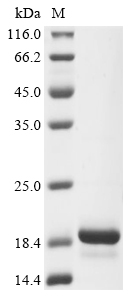Recombinant Blomia tropicalis Fatty acid-binding protein
CAT:
399-CSB-EP621023BTN-01
Size:
1 mg
Price:
Ask
- Availability: 24/48H Stock Items & 2 to 6 Weeks non Stock Items.
- Dry Ice Shipment: No




Recombinant Blomia tropicalis Fatty acid-binding protein
- CAS Number: 9000-83-3
- UniProt: Q17284
- Expression Region: 1-130aa
- Organism: Blomia tropicalis (Mite)
- Target Sequence: MPIEGKYKLEKSDNFDKFLDELGVGFMVKTAAKTLKPTLEVDVQGDTYVFRSLSTFKNTEIKFKLGEEFEEDRADGKRVKTVVNKEGDNKFIQTQYGDKEVKIVRDFQGDDVVVTASVGDVTSVRTYKRI
- Tag: N-terminal 6xHis-tagged
- Source: E.coli
- Field of Research: Others
- Assay Type: Developed Protein
- Relevance: FABP are thought to play a role in the intracellular transport of long-chain fatty acids and their acyl-CoA esters. Binds the natural fluorescent fatty acid cis-parinaric acid and oleic acid by competition, but not retinol, retinoic acid, cholesterol, dansylated or anthroxylated fatty acids such as dansyl-DL-aminocaprylic acid and 12- (9-anthroyloxy)-stereate.
- Purity: Greater than 90% as determined by SDS-PAGE.
- Activity: Not Test
- Length: Full Length
- Form: Liquid or Lyophilized powder
- Buffer: If the delivery form is liquid, the default storage buffer is Tris/PBS-based buffer, 5%-50% glycerol. If the delivery form is lyophilized powder, the buffer before lyophilization is Tris/PBS-based buffer, 6% Trehalose, pH 8.0.
- Reconstitution: We recommend that this vial be briefly centrifuged prior to opening to bring the contents to the bottom. Please reconstitute protein in deionized sterile water to a concentration of 0.1-1.0 mg/mL.We recommend to add 5-50% of glycerol (final concentration) and aliquot for long-term storage at -20℃/-80℃. Our default final concentration of glycerol is 50%. Customers could use it as reference.
- Molecular Weight: 18.9 kDa
- References & Citations: "Structural and ligand binding analysis of recombinant Blo t 13 allergen from Blomia tropicalis mite, a fatty acid binding protein." Puerta L., Kennedy M.W., Jimenez S., Caraballo L. Int. Arch. Allergy Immunol. 119:181-184 (1999)
- Storage Conditions: The shelf life is related to many factors, storage state, buffer ingredients, storage temperature and the stability of the protein itself. Generally, the shelf life of liquid form is 6 months at -20℃/-80℃. The shelf life of lyophilized form is 12 months at -20℃/-80℃.
